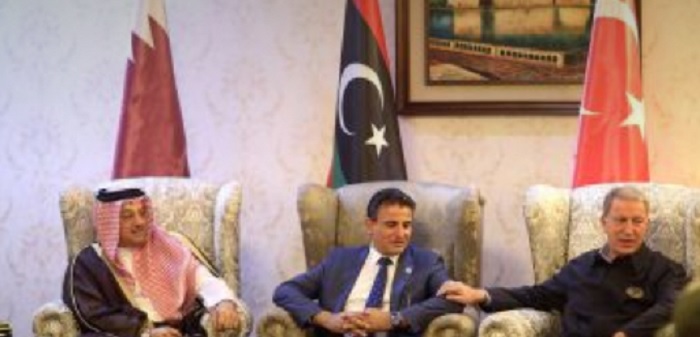
Turkish-Qatari coordination seen preparing for Doha to replace Ankara in exerting influence in Libya.
Turkey and Qatar are moving in Libya in a way that suggests they share a plan to obstruct the settlement path led by the US State Department, in a step that reflects an anticipation of and a challenge to the US obtaining full control of the Libyan file in the post-presidential election phase.
In the time period in which the US administration is almost paralysed, whether President Donald Trump wins or loses his bid for a second term in the White House, the Qataris have moved to return to the Libyan scene after years of hiding behind Turkey’s role there, which is expected to shrink in the coming period.
In a move considered by experts to be a clear violation of the recent inter-Libyan military agreement, Fathi Bashagha, interior minister of the Government of National Accord (GNA), signed a memorandum of understanding on security cooperation with the Qatari Prime Minister and Interior Minister Sheikh Khalid bin Khalifa bin Abdulaziz al-Thani on Monday.
According to analysts, the step reflects a challenge to the United Nations and United States’ efforts to reach a settlement that ends the division in Libya, as well as rejection of the military agreement.
The first article of the memorandum states that it focuses on “cooperation in the field of combating terrorism and organised crime through exchange of information about terrorist organisations and the operational terrorist support networks in terms of supply, funding, research and investigation; helping in identification of individuals and assisting in investigations; and sharing data and expertise on the technical means that contribute to preventing and combating terrorism, provided that the two parties make available to each other the necessary tools that help in combating various forms of international criminality.”
The memorandum also provides for the “formation of a joint security follow-up committee that includes representatives from the concerned departments of the two parties, to follow up on security issues of common concern.”
The signing of the memorandum of understanding coincided with the publication of a statement by US Secretary of State Mike Pompeo welcoming the declaration of a permanent ceasefire in all of Libya.
On Monday, Pompeo said that a ceasefire agreement between Libya’s warring factions was a “courageous step” and that all foreign fighters must leave the country in 90 days in line with the terms of the accord.
Pompeo, who arrived in New Delhi on the first leg of his Asian tour, said it was important that all parties support the success of the UN-facilitated talks in Geneva.
“We commend Libyan leadership on all sides for taking this courageous step,” he said in a statement.
Pompeo’s statements are seen as a warning to all intervening parties in Libya against obstructing the settlement process, but analysts do not overstate the importance of these warnings in light of the continued silence of the White House, which is currently preoccupied with presidential elections coming up on November 3.
These analysts see Turkish-Qatari coordination aimed at having Doha replace Ankara in the Libyan file, as Ankara stands to be among the parties likely to be pushed out of the Libyan scene in the coming period. This was basically the plan that Qatari Defence Minister Khaled al-Attiyah’s visit to Tripoli in August was meant to pave the way for.
Washington is expected to take full control of the Libyan file following presidential elections, regardless of who wins. The Qatari and Turkish moves seem to reflect the fact that the two allies are betting on a Biden victory, which is why they are trying to block any agreement that does not guarantee absolute control over power in Libya to their Islamist allies there.
US involvement in the Libyan file has intensified since the appointment of Ambassador Richard Norland in August of last year. Norland is leading diplomatic efforts aimed mainly at curtailing Russian influence in Libya, amid US accusations that Moscow has deployed mercenaries from the Wagner group and supplied weapons to the Libyan National Army (LNA) led by Field Marshal Khalifa Haftar. In addition to Norland, the US State Department is counting on US diplomat and acting head of the UN Mission in Libya Stephanie Williams.
The Turkish and Qatari moves heighten concerns about the fragility of the Libyan agreement, especially with Ankara’s continued sending of weapons to Libya days before the signing of the agreement, in addition to tweets by the Turkish defence ministry stating that it continues to train the GNA-backed militias as part of the military agreement signed last November, which represents a clear violation of the terms of the recent inter-Libyan ceasefire agreement.
The second article of the permanent ceasefire agreement, signed in Geneva on Friday, stipulates “the freezing of all military agreements related to training inside Libya and the departure of the foreign training crews, until the unified government takes over its duties and directs the security operations room,to be formed under the terms of this agreement, to propose and implement special security arrangements that will ensure the security of the areas vacated by the military units and armed formations.”
 Eurasia Press & News
Eurasia Press & News

